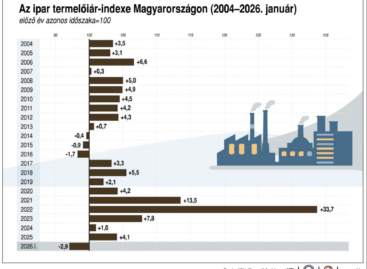Inflation accelerated to 24.5%
Significantly below expectations, inflation jumped to 24.5% in December, which was primarily caused by the cancellation of official fuel prices, but the rise in food prices also continued to accelerate. The positive surprise was caused by a smaller-than-expected increase in food, durable consumer goods and household energy prices. At the same time, the fact that core inflation also jumped very sharply to 24.8% reflects the still strong price pressure. Last year, consumer prices increased by an average of 14.5% –

Since the effect of the introduction of official fuel prices was only partially felt in December, the full effect will be reflected in January’s inflation, so inflation may accelerate slightly further in January. In the coming months, however, due to base effects, we expect inflation to decrease gradually at first, and then sharply from the middle of the year. Base effects can be amplified by the fact that international raw material, crop and energy prices have fallen significantly in recent months, so we do not expect any further external price shocks, and the strengthening of the forint can also moderate inflation. The formation of a price-wage spiral can be observed in some sectors, which may slow down the pace of inflation reduction, however, we still expect single-digit inflation by the end of this year, with an annual average of 17.5% this year.
The Russian-Ukrainian war, the sanctions against Russia, and partly as a result, the decreasing Russian gas deliveries, substantially overrode the inflationary – and economic – prospects, the effects of which cannot be fully estimated anymore. After the outbreak of the war, gas, electricity, and oil prices skyrocketed, which had already caused serious difficulties for economic actors. Although energy prices have moderated in recent months, a significant number of economic operators are still faced with extremely high prices that have developed in recent months after their expiring contracts. However, the development of energy prices remains unpredictable, even though they have shown a sharp decline in recent weeks.
Related news
The GKI business climate index rose in February
🎧 Hallgasd a cikket: Lejátszás Szünet Folytatás Leállítás Nyelv: Auto…
Read more >Inflation has dropped significantly, a cycle of interest rate cuts may begin, while gold soars
🎧 Hallgasd a cikket: Lejátszás Szünet Folytatás Leállítás Nyelv: Auto…
Read more >Related news
Festival buzz at the 60th anniversary EuroShop trade fair
🎧 Hallgasd a cikket: Lejátszás Szünet Folytatás Leállítás Nyelv: Auto…
Read more >Historic price reduction at ALDI
🎧 Hallgasd a cikket: Lejátszás Szünet Folytatás Leállítás Nyelv: Auto…
Read more >







